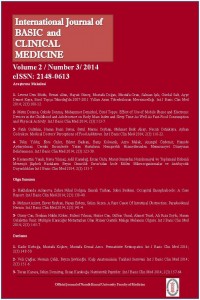Effect Of Use Of Mobile Phone And Electronic Devices In The Childhood And Adolescence On Body Mass Index And Sleep Time As Well As Fast-Food Consumption And Physical Activity
Öz
In this study, we aimed to find out the effects of use of MPs and EDs on body mass index(BMI), sleep-time, consumption of fast-food(FF) and exercise-period of children and adolescents.
Questionnaires were applied related to time-periods of MPs/EDs, sleeping and exercise plus FF consumption. Weight, height, waist and hip circumferences were taken. Data of 50 cases using MPs and data of 50 cases who do not use MPs were compared. PASW-18 statistics program, chi-square, independent sample and Mann-Whitney U Test were used. p≤0,05 was accepted as statistically significance value.
Boy/girl ratio was 1/1 in MP(-) group, and it was 0,92 in CT(+) group. Mean age was 121.32±21.22 in MP(-) group, and it was 147.34±24.63 in MP(+) group. Daily usage period of EDs was 234.10±114.49 in MP(-) group, and it was 286.70±116.32 in MP(+) group (p≤0,05). BMI of MP(-) group was 19.01±5.08; and it was 20.88±4.74 in the MP(+) group (p≥0.05). Daily sleep-time was 9.42±1.08 in the MP(-) group, and it was 8.74±1.06 in the MP(+) group (p≤0.05). Weekly frequency of consumption of FF and sweetened-foods in MP(-) group was 2.38±2.85; and it was 5.14±6.93 in the MP(+) group (p≤0,01). Daily active-period of MP(-) group was 147.74±254.04, and it was 95.60±64.77 in the MP(+) group (p≥0.05).
Our study emphasizes that decreasing the time spent with EDs, especially with MPs, can be beneficial for minimizing consumption of FF and sweetened foods, prevention of development of obesity, maximizing the time for physical activity and providing optimum sleep time period in children and adolescents.
Ayrıntılar
| Birincil Dil | Türkçe |
|---|---|
| Konular | Sağlık Kurumları Yönetimi |
| Bölüm | Araştırma Makaleleri |
| Yazarlar | |
| Yayımlanma Tarihi | 26 Ocak 2016 |
| Yayımlandığı Sayı | Yıl 2014 Cilt: 2 Sayı: 3 - Int J Basic Clin Med |


